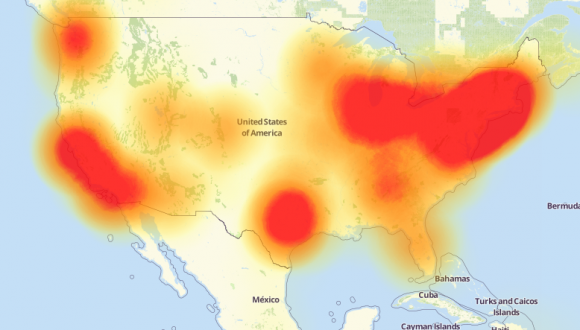🔊 NEW! Neocash Radio Ep. 179: AT&T’s For-Profit Spying Scandal, OpenBazaar Deploys Stores, the Pentagon Steals from Soldiers, and a Cyberwar is Heating Up!

An update on the U.S.-Russia Proxy War. News about the recent mass internet outage that affected NE U.S. AT&T secretly spied on their customers for profits and now wants to buy up Time Warner and more! Eurozone approves the latest bailout for Greece. Chinese State Banks selling dollars to shore up the falling Yuan. Facebook Messenger bots let you buy things with PayPal. Venezuela escapes bankruptcy while Venezuelan congress calls for a trial for Maduro. The pentagon steals from soldiers. Debit card holders in India beware! Blocksize or Blocktime? Open Bazaar releases some updates and a way to have your store hosted in the cloud. The Ethereum attack’s IP may have been found. Ethereum Classic is upgrading and hard forking.
All this and more on Neocash Radio episode 179 here on Wednesday October 26th, 2016!
Stream this episode:
or Direct Download the MP3 – Neocash Radio Episode 179
Tune in to Neocash Radio every Wednesday night and
RETWEET ALL THE THINGS @NeocashRadio!
RETWEET ALL THE THINGS @NeocashRadio!
on iTunes / Soundcloud / Stitcher / and Google Play Music!
We’re also on Tunein, Player.FM, Overcast.FM, Podcast Addict, Blubrry, and more!
| Traditional Markets | Crypto Markets |
| Gold $1267 | Bitcoin (BTC) $675 |
| Silver $17.59 | Litecoin (LTC) $3.93 |
| Oil $49.21 | Ethereum (ETH) $11.50 |
| Dow Jones 18,199 points | DASH $9.24 |
| 30Y UST Yield 2.543% | Monero (XMR) $5.99 |
| Euro (EUR) $1.09 | STEEM ~$0.14 |
| Chinese Yuan (CNY) $0.15 | AMP ~$0.15 |
| British Pound (GBP) $1.22 | 1 Doge = 1 Doge |
Prices as of Wednesday 10/26/16 @6pm Eastern
"America needs Russia as an adversary," says Karen Kwiatkowski, a retired US Air force Lieutenant Colonel. NATO generals have had leaked email expose their plot to stir up conflict including a show of force this summer with the largest War Games operation since the cold war. The German Foreign Minister said: "What we shouldn't do now is inflame the situation further through sabre-rattling and warmongering." More recently NATO and has been moving troops to the Russian border as if Russia was going to start invading neighboring countries any day now. The western media makes a point to nitpick Russian air strikes while sweeping US collateral damage under the rug. A Russian naval group is heading to the mediterranean and a NATO row over Spain refueling the ships highlights how misplaced outrage is. Given the escalation and hyperbolic rhetoric, World War III may start before Hillary Clinton takes office.
Update on the U.S.-Russia Proxy War in Syria (02:36)
A Chicago Tribune article highlights the ridiculous nature of the conflict ongoing in Syria. Pentagon funded rebels are battling CIA funded rebels and vice versa. And in some cases both groups are working with, coming from, or defecting to Islamic State militants. The only thing that is certain is the US and Saudi Arabia have funded or supplied much of the unrest that is intended to destabilize Syrian President Assad to foment regime change.
CyberWar 2016: Hacked Cameras, DVRs and other “Internet of Things” Devices Powered Recent Massive Internet Outage (05:28)
Late last week, a large and sustained internet attack caused outages and network congestion for a large number of Web sites including Twitter, Amazon, Tumblr, Reddit, Paypal, Spotify, AirBnB, and Netflix. This Distributed Denial of Service (DDoS) attack was apparently launched with the help of hacked “Internet of Things” (IoT) devices like closed-circuit security cameras and digital video recorders.
A newer malware strain—called Mirai—was used to scour the Web for IoT devices protected by insecure factory-default usernames and passwords, then overtaking the devices to launch junk traffic at specified online targets so that they can’t accommodate legitimate visitors or users.

A visualization of the internet outages caused by the attack on Dyn
(source: DownDetector.com)
One manufacturer behind many of the cameras and other IoT devices allegedly utilized for this attack—XiongMai Technologies—is reportedly recalling millions of its products.
Interestingly, a major target of the attack was Dyn, an internet infrastructure company located here in Manchester, NH, just blocks from Neocash Radio HQ. Are attacks like this going to bring us to a decentralized internet sooner?
AT&T secretly makes millions selling customer data to law enforcement (07:25)
In episode 176, we covered the story about Yahoo secretly scanning user emails for the government. AT&T has a confession to make as well. Project Hemisphere is a spy tool for law enforcement with agencies paying from $100,000 to over $1,000,000 dollars. Let’s break it down: A company you buy a service from is secretly betraying your trust and selling your data to a law enforcement agency that you are forced to pay for. Taxpayers must be sheep to these people.
This has come to light just as AT&T is looking to become the largest media company in the world. Wireless communications & paid-television provider AT&T has finalized a deal to purchase media giant Time Warner for $85.4 billion in a half-stock, half-cash deal, which includes taxpayer funds made from the secret spying program. Included in the package from Time Warner are CNN, TNT, HBO, and the Warner Bros. TV/film studio as well as the rights to the Batman franchise from DC Comics. While it may face an uphill regulatory battle, the deal could reportedly close as soon as the end of 2017.
Header image by Rob Hyrons for The Daily Beast
Eurozone fund approves €2.8 billion bailout loans to Greece (10:35)
On Tuesday morning, Eurozone creditors approved a €2.8 billion ($3.04 billion) bailout to debt-laden Greece after the government created a privatization fund to pay down the country’s debt and completed several prescribed economic reforms to the pension system and energy sector.
€1.7 billion of the loans will be used for clearing arrears owed to domestic contractors and the remaining €1.1 billion will be used for “debt servicing.” The approval from creditors marks the end of the first review of Greece's €86 billion bailout, approved in August 2015.
Perhaps eerily similar to the Confessions of an Economic Hit Man, Greece is offering up natural resources to foreign bidders. French and Italian Companies are inline to secure blocks for deep sea gas and oil drilling. Greece is also suffering from issues concerning the influx of refugees with 169,302 arrivals via the Aegean Sea this year so far, not counting the 3,671 people who were not able to make the perilous crossing. The Greek islands have nearly 16,000 migrants trapped there with a total of around 60,000 migrants throughout the country. While some aid is coming in from relief efforts across the Eurozone, current subsidies are draining funds from Greece’s impoverished coffers.
Chinese State Banks Seen Selling Dollars as the Yuan Hits a 6-Year Low (13:12)
Last year the Yuan’s rise and fall was met with market panic but at a point when there are much larger worries the Yuan hitting a six year low was less of a spectacle. State-run banks sold off dollars to ease the drop and the weakened currency ended the week with a slight recovery.
Facebook Messenger now supports PayPal payments in bots, will track your PayPal receipts (16:13)
Facebook Messenger users can now use PayPal to make purchases through new chatbots, automated customer service bots that companies can develop to facilitate any number of queries or transactions. While there are currently about 30,000 chatbots on Facebook, a relatively small number are being used to sell products, though Domino’s and Pizza Hut are definitely already on top of it. This PayPal functionality is only being rolled out to Facebook Messenger users in the U.S. currently.
Venezuela Escapes Bankruptcy, Oil Production Continues To Plunge (17:01)
Creditors holding $2.8 billion of bonds have agreed to extend maturities for Venezuela’s state-owned petroleum company—Petroleos de Venezuela SA (PDVSA) after weeks of tense negotiations and dire warnings of a potential financial collapse. Previous notes due in April 2017 and November 2017 were swapped for new notes with annual payments through 2020; PDVSA will issue $3.4 billion in new debt to complete the exchange. PDVSA is guaranteeing the 2020 bonds by pawning 50.1% of the shares in its U.S. subsidiary, Citgo Holdings.
PDVSA still has $6.1 billion due in principal payments by the end of 2017, and swaps traders are reportedly calculating a 51 percent probability the company will default in the next 12 months.
Venezuelan crude production shrank 11% to 2.3 million barrels a day in a year to September. Worse yet, as production decreases, the Wall Street Journal reports that a number of the wells in Venezuela are flaring gas and burning oil simply because they lack the funds to get equipment to properly process it.

Meanwhile, tensions continue to escalate between President Nicolas Maduro and his opposition. Last week, the country’s electoral council nixed the opposition’s demands for a referendum to impeach Mr. Maduro, sparking numerous large protests. The Vatican is now attempting to have the Pope mediate and “build trust between the various parties.”

Thousands of California soldiers forced to repay enlistment bonuses a decade after going to war (20:00)
When the U.S. military was coming up low on mercenaries to fight in Iraq and Afghanistan 10 years ago, the California National Guard lured nearly 10,000 soldiers in with bonuses of $15,000 or more to reenlist and go off to war. But now, as approval ratings and financial support for all of America’s wars are dwindling fast, the Pentagon is demanding the money back.
Many of these soldiers were deployed into combat on several tours and are now being ordered to repay these large enlistment bonuses—with interest—under threat of wage garnishments and tax liens if they refuse to comply. This is imposing severe financial hardship on many veterans who say the military is reneging on their deal.
Audits exposed rampant, widespread overpayments by the CA National Guard, pressured to meet enlistment targets at the height of the wars last decade.
Today, Defense Secretary Ashton B. Carter announced he has ordered the Pentagon to pause its efforts to collect payments “until measures can be put in place to provide the affected service members with the support they need to appeal the process.”
Debit card holders in India beware! (23:28)
As many as 3.2 million card holders may be affected by a huge security breach in India. Hitachi Payment Services provides ATMs and point of sale services, an investigation found a malware-induced security breach in their systems. Nineteen banks report fraudulent transactions so far. Some cards will be reissued while most customers have been asked to change their PIN numbers.
Blocksize may not be the only option (24:42)
PhD student Arthur Gervais and the Swiss Federal Institute of Technology in Zurich have created a simulator that can run Bitcoin proof-of-work simulations with a variety of different parameter changes from blocksize or block time to network or communication techniques.
”According to my research the one-minute block interval seems like the most plausible. I don’t mean that it provides sufficient security, but that it would provide the same security as Bitcoin has today,” Arthur Gervais told Coindesk.
Naturally, Bitcoin Core contributor Greg Maxwell is actually advocating for slightly longer than ten minute blocks. It seems that Core developers will only consider off-chain solutions to Bitcoin's transaction throughput dilemma.

Bitcoin-Based OpenBazaar Releases New ‘Deploy’ Program, Full Update (25:57)
A big issue with the first release of OpenBazaar was the need for you to have your node running in the background constantly so that other users could browse your goods. Once you shut off your computer the store would not be viewable. Version 2.0 of Open Bazaar will include an InterPlanetary File System to distribute store data between peers. That is slated for release sometime next year.
Until then you can run a new program called Deploy. Working in association with a Digital Ocean cloud hosting account for $5 a month, one can create a node in the cloud to host their store data 24/7. Open Bazaar has also released a client-only desktop application. Until now the desktop application would run a server node in the background whether you were using that functionality or not.
Ethereum Attacker’s IP address may be traceable (26:44)
A series of attacks has been plaguing the Ethereum network for the past month. Some seriously internet sleuthing has gone down and the IP address of the attacker has been discovered. Blockchain transactions link the attacker to a DwarfPool mining account.
Ethereum Classic Upgrades and a Successful Hard Fork
The attacks that led to the 2nd hard fork of Ethereum have also affected Ethereum Classic causing the developers to hard fork the blockchain with the same gas repricing fix.
"Because of the technical nature of this fork and important security vulnerabilities it addresses, there was no contention about it within the community," lead developer Arvicco told CoinDesk. The developers have also been busy with changes that included a removal of the mining difficulty bomb slated for next summer.
 We’ve also got a special bonus interview with Roger Ver that we posted on Friday! Listen in as Bitcoin Angel Investor and Bitcoin.com CEO Roger Ver talks with us about how the current Bitcoin block size limit is throttling the Bitcoin network, and how Bitcoin Unlimited could be poised to increase the block size and allow the Bitcoin network to scale.
We’ve also got a special bonus interview with Roger Ver that we posted on Friday! Listen in as Bitcoin Angel Investor and Bitcoin.com CEO Roger Ver talks with us about how the current Bitcoin block size limit is throttling the Bitcoin network, and how Bitcoin Unlimited could be poised to increase the block size and allow the Bitcoin network to scale.
The future of money, today!
You covered this post well. Haha I got a kick out of the "facebook bots" that Mark and the gang are trying to run for the sheep!